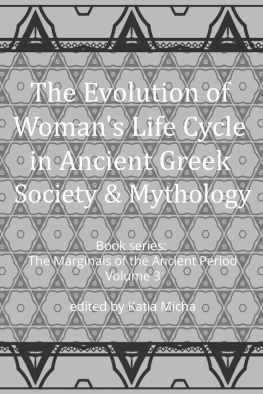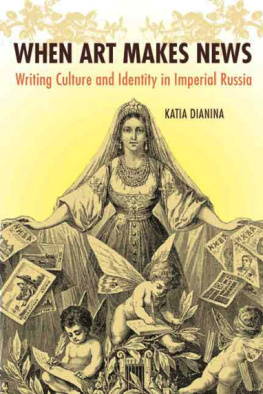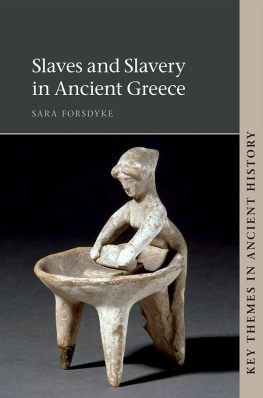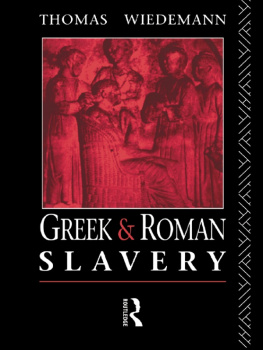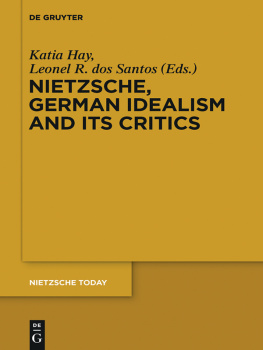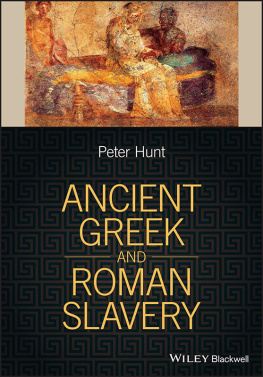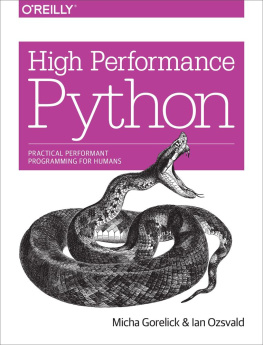Katia Micha - Slavery through Ancient Literature
Here you can read online Katia Micha - Slavery through Ancient Literature full text of the book (entire story) in english for free. Download pdf and epub, get meaning, cover and reviews about this ebook. year: 2020, publisher: Katia Micha, genre: Romance novel. Description of the work, (preface) as well as reviews are available. Best literature library LitArk.com created for fans of good reading and offers a wide selection of genres:
Romance novel
Science fiction
Adventure
Detective
Science
History
Home and family
Prose
Art
Politics
Computer
Non-fiction
Religion
Business
Children
Humor
Choose a favorite category and find really read worthwhile books. Enjoy immersion in the world of imagination, feel the emotions of the characters or learn something new for yourself, make an fascinating discovery.
- Book:Slavery through Ancient Literature
- Author:
- Publisher:Katia Micha
- Genre:
- Year:2020
- Rating:5 / 5
- Favourites:Add to favourites
- Your mark:
- 100
- 1
- 2
- 3
- 4
- 5
Slavery through Ancient Literature: summary, description and annotation
We offer to read an annotation, description, summary or preface (depends on what the author of the book "Slavery through Ancient Literature" wrote himself). If you haven't found the necessary information about the book — write in the comments, we will try to find it.
Katia Micha: author's other books
Who wrote Slavery through Ancient Literature? Find out the surname, the name of the author of the book and a list of all author's works by series.
Slavery through Ancient Literature — read online for free the complete book (whole text) full work
Below is the text of the book, divided by pages. System saving the place of the last page read, allows you to conveniently read the book "Slavery through Ancient Literature" online for free, without having to search again every time where you left off. Put a bookmark, and you can go to the page where you finished reading at any time.
Font size:
Interval:
Bookmark:
 |  |



All rights and licenses reserved.
Independently published, July 2020

Book series: The Marginals of the Ancient Period
Volume 2: Slavery through Ancient Literature
Edited by Aikaterini (Katia) Micha
Athens, Greece
 |  |


W E FIRST CRUSH PEOPLE to the earth, and then claim the right of trampling on them forever, because they are prostrate [1] . - Lydia Maria Child
This book deals with ancient texts drawn from two distinct literary traditions, Greek and Latin. In addition it is in debt to the English language literature of captivity and slavery especially in an American or North African setting. [2] Less obtrusively it is also in dialog with other traditions particularly that of medieval Arabic, medieval Western European, and Byzantine literature as well the Spanish of the Golden Age particularly the works of Batholom de Las Casas and Miguel Cervantes. [3] Finally, it also is in dialog with accounts of contemporary slavery. [4] Bringing together these types of diverse material and perspectives requires harmonizing differing scholarly conventions and preoccupations. This cannot ever be a completely successful task and so these prefatory notes will help to explain both our methodology and its rationale in setting out this studys priorities.
Whether we consider the ancient novels to be products of the late Julio-Claudian period through the late Severan or late Neo-Flavian (Constantian) period, we are talking about periods of widespread bi and trilinguality. There is not any serious reason to doubt the writers of ancient novels mastery of both Greek and Latin. The only question concerns their ability to function in a third or fourth language such as Aramaic, Syriac, Punic, Berber, Coptic, or Proto-Arabic. Educated people, like Paul of Tarsus, were able to communicate not only in several languages but also in several cultural contexts. At Mars Hill, Luke presents St. Paul as able to successfully syncretize seemingly irreconcilable cultural contexts. [5] This type of linguistic and cultural virtuosity would always be rare but it was hardly unheard of in the period during which the novels were produced. Plutarchs comparative biographies and cultural studies, Josephus histories, Athenaeus Dinner of the Sophists, the oeuvres of Apuleius and Lucian of Samosata, Aulus Gellius Attic Nights, Heliodorus novel, Cassius Dios histories, and the orations of his purported uncle Dio Chrysostom all demonstrate an ability to move from one cultural and linguistic sphere to another with seeming ease. [6]
This cultural virtuosity was perhaps aided by the fact that the classics of Latin literature did not arise solely from Old Latin in a monocultural environment. As Denis Feeney argues, Latin Literature itself is the wonderfully original result of the fusion of Old Latin with Greek language and culture spiced with a tri-lingual infusion of other Italic, Punic, and Celtic influences. [7] Despite the proliferation of loan words and grammatical borrowings, imperial era Greek and Latin never fused into a single macaronic dialect like Spanglish or Veneto-Cretan. [8] However, the imperial project required that Greek and Latin cultures and languages be translatable. The limits to this translatability can be seen in Lukes account of the mission at Lystra, a Roman military colony tasked with suppressing raids by hill tribesmen from the client kingdom of Cilicia Aspera on the settlements of the Galatian plain. [9] Syncretic blending of religious and cultural traditions can extend further than expected commonality of language. Lukes St. Paul, though speaking Greek, Hebrew, and Aramaic cannot quite make himself understood by speakers of a Phrygian, Laodicean, or Galatian dialect who identify their gods with the Olympic pantheon. [10] Therefore while this book assumes that there was a readily available cultural context for translating both words and concepts in the Roman oikumen between bilingual speakers of Greek and Latin, it is much more cautious in extending that possibility outside the oikumen. For example, in some ways the Arabic word abd seems to translate the Greek and Latin pairing of doulos/servus nicely. [11] There is even a tradition of slave (abd) of love in Islamic literature. [12] However, we cannot expect such translatability in the case of mamluk. [13] Mamluk could be equivalent to pais/puer in some situations but its connotation is strongly military as in the modern child soldier. Mamluk (mmlk) is usually transliterated rather than translated from Arabic/Ottoman/Persian sources.
Greek, Latin, and English terminology is sometimes used interchangeably as in household, oikos, or domus. These words are equivalents and changing languages avoids monotony. Nevertheless, terms like household, oikos, and domus all connote slightly different things without changing their translatable meanings outright. This is especially useful when discussing slavery as each form has a wide range of sound triggered allusions. Household recalls householder in the King James Bible and is useful to suggest an English-speaking slave-owning environment. Domus suggests domestic both as domesticated (animals) and domestic (sexual relations). However, domus especially connotes the dominium or dominance of the dominus/domina. In the Neo-Hellenic pronunciation and vocabulary on the other hand, oikos may suggest economic relations but primarily it suggests informal structure and lenient hierarchal relations as in oikonomia. Dominance is not suggested here as that term is despota/despina from which we derive the term despotism. Mastery connotes skill as in dominus/domina and not simply legitimate authority as in the Late Antique and Byzantine despots/despoina. Mistress in contemporary English carries a sexual connotation, as does domina, but in Latin elegy dominas sexual connotation overrides its legal slave-owning foundations as in the Institutes. For these reasons we use the term mistress strictly as a term denoting legal authority and domina as little as possible.
The term Republic or Republican is primarily used here to mean Rome or Roman during the period through the civil wars until the Augustan settlement. The imperial period refers to Rome after the settlement. Augustus and Caesar are primarily used as personal names and not titles. Principate refers to the Roman constitution after the Augustan settlement and princeps to the Julio-Claudian rulers specifically in an Italian connotation. Emperor and empire, when associated with Rome, the Greek basileus and its related terms including oikumen, are used when the Greek texts suggest their use. Autocrator and basileus are not words derived from as we might expect if the Greek language was actually trying to come to terms with the constitutional meaning of princeps. The Greek text of the Res Gestae Divi Augustii describes the Republic simply as Augustus patris and makes no note of his relationship to the oikumen. [14] Nonetheless, it does seem as if some of the principes of the Republic began to see themselves as related to the oikumen. Geoff Adams notes that Nero, Hadrian, and Marcus Aurelius were all accused of identifying with their Greek subjects rather than with their Roman compatriots. [15] Country and Empire would become formally merged with the extension of citizenship to all free born people in Commodus so called Antonine Constitution of 212. [16] From the perspective of ancient novel studies, it is striking that the dating of the novels clusters around the reigns of the most Philhellenic principes when Roman came closest to being completely identified with oikumen. Even if we cannot strictly say that Empire and Emperor are accurate terms for describing the political situation before Commodus, it would not be incorrect to suggest that the ancient novels were produced in a cultural environment that reflected the Roman Empire rather than the Principate.
Next pageFont size:
Interval:
Bookmark:
Similar books «Slavery through Ancient Literature»
Look at similar books to Slavery through Ancient Literature. We have selected literature similar in name and meaning in the hope of providing readers with more options to find new, interesting, not yet read works.
Discussion, reviews of the book Slavery through Ancient Literature and just readers' own opinions. Leave your comments, write what you think about the work, its meaning or the main characters. Specify what exactly you liked and what you didn't like, and why you think so.


